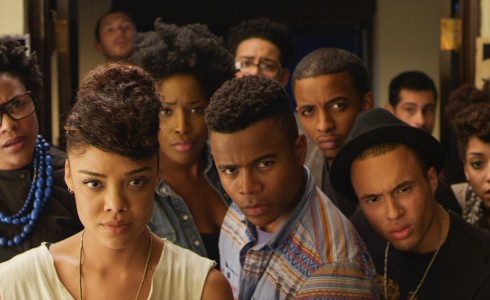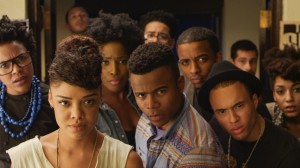Movie a Day Blog has a long history with black cinema.
I produced an iconic black action drama, SET IT OFF (1996) starring Queen Latifah and Jada Pinkett, and another mostly-black film with Denzel Washington, THE MIGHTY QUINN (1989). I am a longtime fan of Blaxploitation Cinema, a sometimes-genuine explosion of black culture and politics from the 1970s, and I have long taught a class on the history of black cinema, “Black and White: Race and Image in American Film.”
All this is prefatory for the great sense of anticipation I felt while driving to see DEAR WHITE PEOPLE (2014), an independent black-written-produced-directed-cast film that won a Special Jury Prize at this year’s Sundance Film Festival and several other festival awards. The advance buzz was hot; I saw and liked the director on The Colbert Report.
Nothing I had heard or read prepared me for what I saw: a poorly written, directed and acted travesty that did no credit to its ostensible subject, exposing a racist-themed fraternity party and the events that lead up to it. Several of these stupid parties have occurred around the country in recent years, most recently right here in Winston-Salem, North Carolina, where Wake Forest University forced a fraternity to cancel a “come as a rap musician” party.
Most of these frat parties include whites wearing blackface, Afro wigs, eating watermelon and chanting rap — this is supposed to be harmless fun, right? So the idea of showing the impact of this backwards thinking on the small core group of black students who fight for their identity at any elitist college is an interesting one.
Writer-director Justin Simien, making his debut feature after three short films, blows this golden opportunity with a simplistic, cliched and God forbid, stereotype-driven approach to storytelling. The tropes are about the same as the ones that existed in ANIMAL HOUSE (1978): a racist college president, an Uncle Tom black dean, a rich white kids fraternity, another for geeks, and in this ridiculous update, a black “house” fearful of losing its essential place in black campus life now that students are being channeled into random houses.
Spike Lee faltered on this same territory when he made SCHOOL DAZE (1988), and couldn’t avoid that era’s cliches of black college life, albeit at an HBCU. DEAR WHITE PEOPLE takes place at Winchester University, which we are led to believe is akin to, honestly, I don’t know. It doesn’t seem to matter.
Siemen’s approach to narrative is like his approach to the musical cues that intrude on every sequence; they seem chosen at random, void of relationship to the words and images accompanying them. Simien’s focus keeps shifting from Morris Chestnut-type Brandon P Bell, who just happens to be the son of Dean Dennis Haysbert (seriously miscast), to Tessa Thompson, the single most effective performer in DEAR WHITE PEOPLE, and then to Tyler James Williams, who is saddled with a giant Afro and black glasses to match. It’s as if the film can’t decide whose story it’s telling, so it does a poor job with all of them.
Thompson has real screen presence, even when mouthing the film school-sounding dialogue; Semien seems to have missed the class on showing, rather than telling, so every character ends up with a major monologue to explain their feelings and progress, just in case those of us in the audience didn’t get it.
The film’s title comes from Thompson’s radio show (her sexy profile with a giant penis-like microphone is another familiar trope that Spike used in DO THE RIGHT THING (1989)), where she makes sarcastic comments to well-meaning but clueless white students like the one with whom she happens to be secretly sleeping. But he is given no personality at all, typical of how characters both black and white are treated. Everyone seems to be a one-note type in DEAR WHITE PEOPLE, and while I know I’m old and white, I just didn’t get the joke, if that’s really what it is. This film has all the originality of a chain letter.



Comments are closed